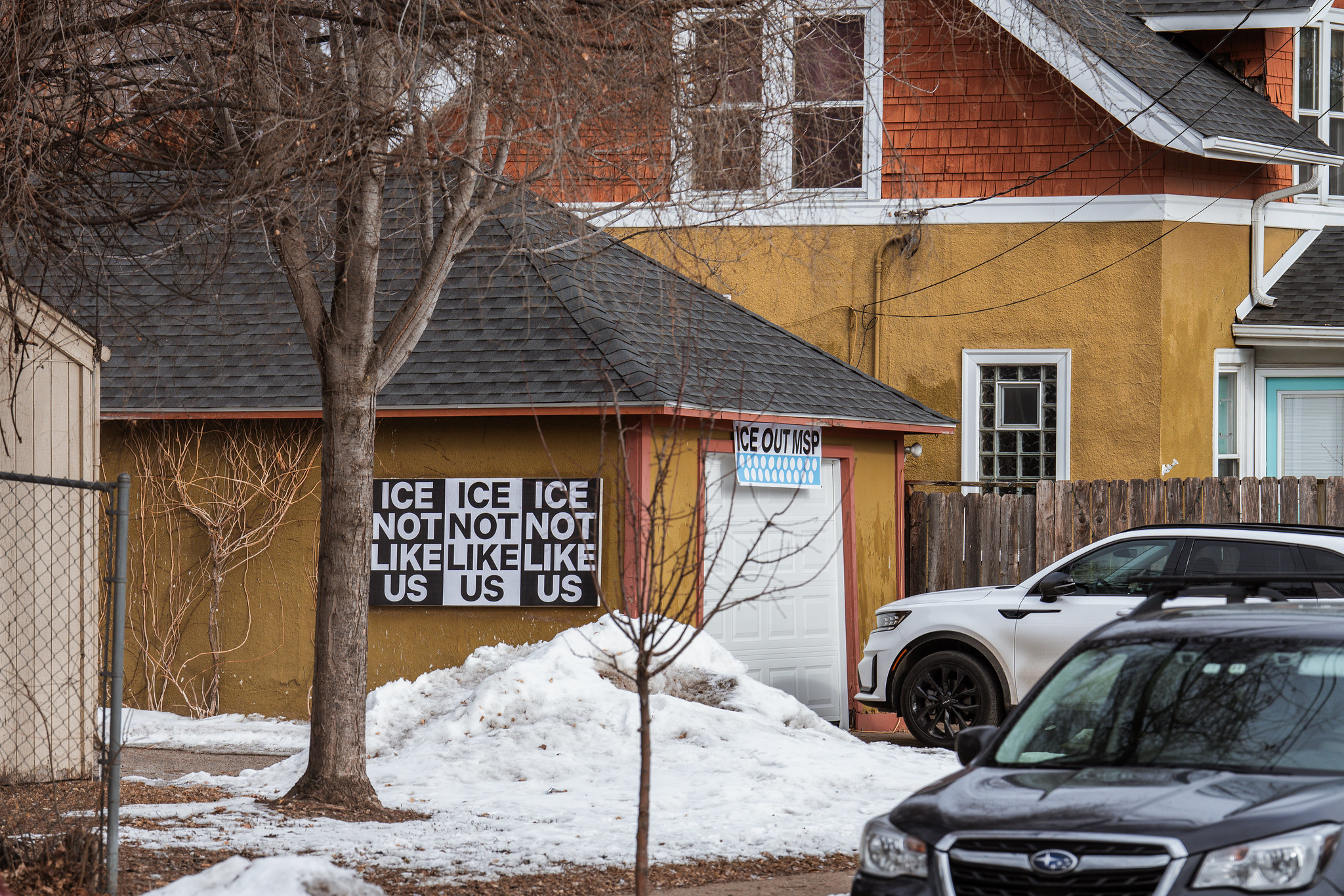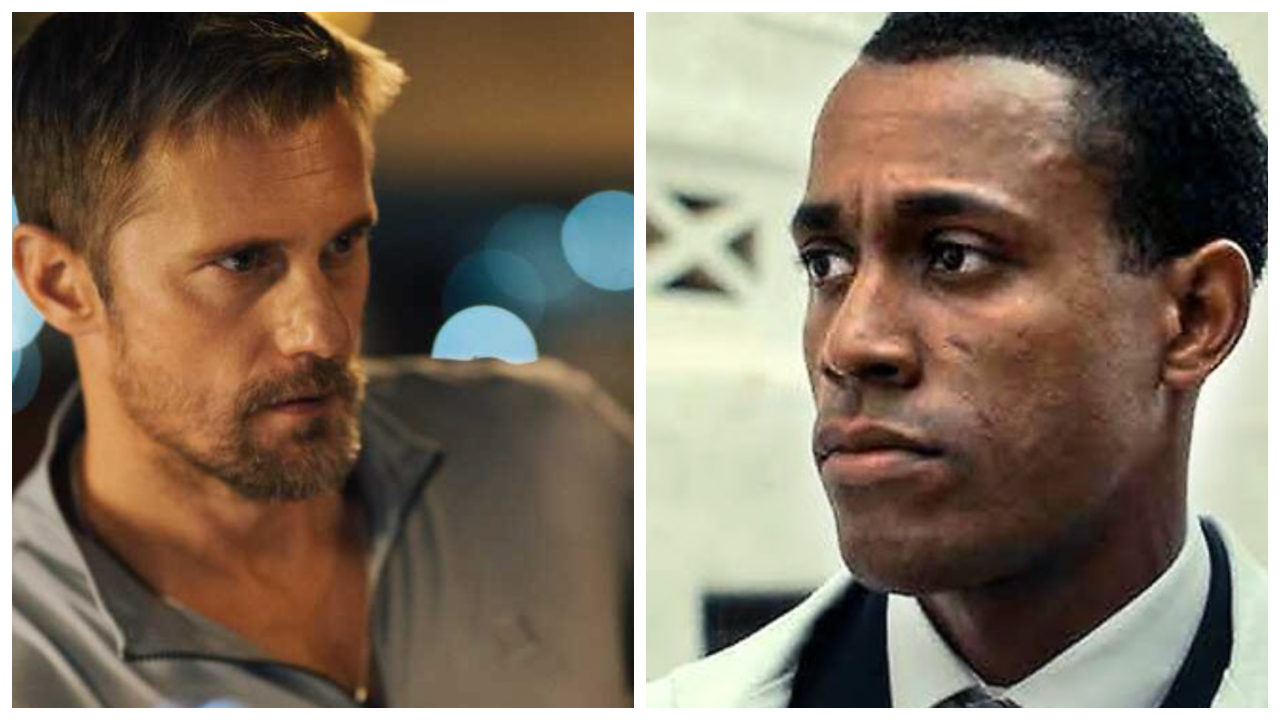The idea of volunteering might conjure images of people prepping meals, cleaning parks, or delivering groceries. But volunteers power… well, just about every kind of organization you can imagine. The Twin Cities has volunteer-run record stores (Extreme Noise) and bike shops (The Grease Pit). You’ll even find volunteer-run stands like the Midway Men’s Club at the Minnesota State Fair.
Why go with this model? What are the challenges? And what makes volunteers willing to spend their hours sifting through stacks of CDs or sweeping movie theater popcorn? We caught up with volunteers at Boneshaker Books, KFAI, and the Trylon Cinema to ask them how it works.
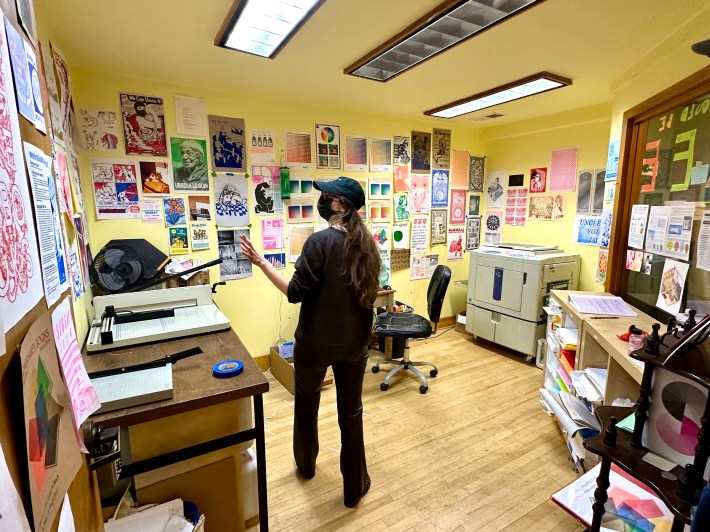
“Tiny Slivers of a World That’s Better”: Individual Action and Collective Ownership at Boneshaker Books
Boneshaker Books sits in a building that feels a little like something out of a book, blanketed as it is in a thick layer of overlapping vines, with its sign often obscured by foliage. Something with a title like The Radical Booksellers of Seward, maybe, or Risographs Under the Ivy.
That sense only increases when you step inside and encounter the small group chattering away behind the counter, lobbing gentle jokes at one another and calling out to the occasional customer to see if they need any help. They’re channeling Statler and Waldorf from The Muppet Show, says volunteer Dan Samorodnitsky, if those cantankerous old puppets somehow developed an interest in leftist politics and zine making.
Born from the ashes of long-running radical bookstore Arise!, which closed in 2010, Boneshaker is a collectively run Minneapolis shop powered by a group of 30 to 40 volunteers. “I always say that Boneshaker isn’t quite an anarchist bookstore, because we can’t settle on a definition of anarchism that everybody would agree to—which is a very anarchist thing,” laughs Bessie Browne, who’s been volunteering on and off at Boneshaker since 2013.
The group of not-quite-anarchists meets as a collective about once a month to make big decisions about the shop, and they choose a new board each winter. (The current group is a “new” collective that formed to rescue the store in 2020 after it almost closed due to a combination of burnout and credit card debt.) They keep in touch with one another using the messaging platform Discord, and most work about one shift weekly.
And as for everything else that happens at the shop week after week? Well, that’s entirely up to its volunteers.
“The limits are the same as the possibilities, which is just like, what can individual initiative and autonomy do?” says volunteer Corbin Dewitt. Someone wants to start a new book club at Boneshaker? Sure! Or wants the shop to participate in Indie Bookstore Week or the Seward Yard Sale? Why not?
“So many people come into the store and are genuinely interested in doing these little projects, or helping the store run, or making sure things are organized,” Dewitt continues. “You see that people genuinely like to do things on their own initiative.” Browne, for example, is on the consignment committee because she makes and sells zines through the shop and cares that this work is getting done and getting done well.
At Boneshaker, business decisions are not motivated by profit or personal pay, but by curiosity and personal interest. It might be a little less organized than things are at your traditional bookshop; it took some time before Samorodnitsky finally got the store set up with a phone. He nods to another volunteer-run local business, Free Geek, for helping with the phones and for supplying Boneshaker’s computers.
But it’s a place where anything can happen. Red Threads, a clothes mending skillshare, meets at the shop on third Thursdays. The risograph printer, a post-pandemic addition, has sort of become “the heart and soul of the store,” Dewitt says, with the Boneshaker Print Collective offering intro workshops and low-cost printing. The Women’s Prison Book Project has operated out of Boneshaker in the past; so has Twin Cities DSA.
And it’s a place that welcomes newcomers, outsiders, and oddballs of all kinds. Many of those volunteers are young and/or queer, and many are transplants for whom Boneshaker was their first connection to a community in the Twin Cities.
“Volunteering here a couple times a month, I [often] meet a queer person who has just moved to the Twin Cities or is thinking about moving to the Twin Cities from a red state being like, ‘Is this where I’m going to find community?’” Browne says. (And if that sounds like it might be interesting to you, you can always join them by emailing volunteering@boneshakerbooks.com.)
“The world is terrifying right now, and [my question is], what can we do about that?” Browne continues. “As an anarchist, my answer is, ‘I can do tiny things in small ways… and I can start making tiny slivers of a world that’s better.’”
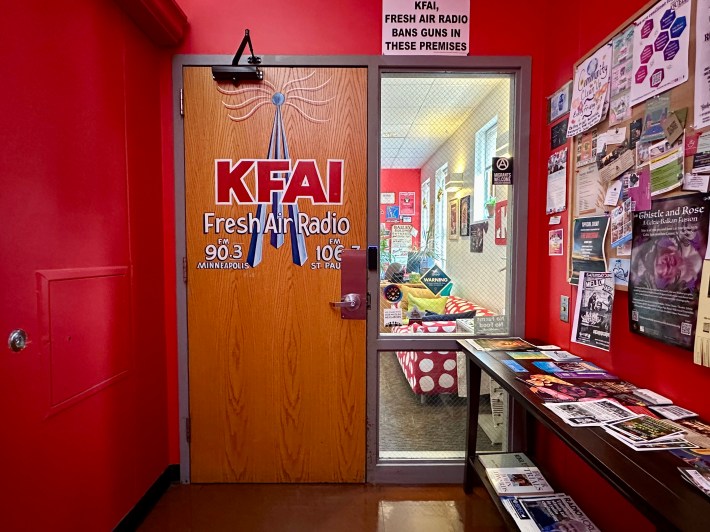
“A Precious and Finite Resource”: At KFAI, There’s Freedom in the Free-For-All
On the popular web series Subway Takes, musician Cole Haden recently made a case for getting rid of your aux cord and just listening to the radio. “I think there’s a lot of places where people can give up control in their life,” he reasoned, “and the radio is a good place to start.”
It’s a good take, but even as I nodded in agreement, I couldn’t help but think to myself that if you truly want to give up control, you need to listen to 90.3 FM, KFAI, where you really never know what you’re gonna get.
On The No Stress Express (Mondays from 10 a.m. to noon) Tony Paul spins a mix of calypso, reggae, and dancehall. Abbi’s Room for One (Sundays from 10:30 p.m. to midnight) is where you’ll hear punk, garage rock, and new wave. On Tuesdays from 4-6 p.m., Lady J Griot plays roots and blues; Friday from 4-6 p.m. is Latino AltROCK! with DJs Raul Escobar and PapiU.
Afrobeat, jazz, grindcore, Balkan beats—KFAI’s programming spans every musical era and genre, slotted alongside dozens of news and talk shows like Somali Link Radio. Pete Lee, host of Bop Street (Mondays from 4-6 p.m.), remembers a KFAI poster from the early ’90s that summed it up thusly: “The only station that does the channel surfing for you.”
The noncommercial community station broadcasts 24/7/365, and of its roughly 86 programs, 84 are generated by hosts at its Cedar-Riverside studio on Minneapolis’s West Bank. And all of this happens with just four paid employees: volunteer coordinator Ellie Zimmerman, program director Miguel Vargas (who also hosts two radio shows), executive director Nora Doherty, and business membership coordinator Debra Gonsioroski.
“Then, there’s over 200 volunteers—everybody you hear on air,” Zimmerman says. It’s been that way ever since the station first started broadcasting in 1978.
It’s a remarkable and rare thing, especially when you consider the autonomy DJs have. “We have a lot of trust and faith in our hosts. They don’t have to run their show by us every week, we don’t have any kind of format,” Zimmerman continues, then adds, perhaps noting my raised eyebrows, “I guess from an outsider’s perspective it would seem like a free for all.”
Vargas grins, admitting that his programming director position is “somewhat of a false title.” He doesn’t conceptualize shows or direct content like someone in his role would at a typical radio station.
“Everybody sets their own content agenda, so it’s all about developing their ideas,” he says. For Vargas, whose KFAI career started when he began volunteering in 2010, the job is more about helping hosts realize their vision while bringing in new listeners, something he also tries to do with his shows Radio Pocho and Cedar Sunrise.
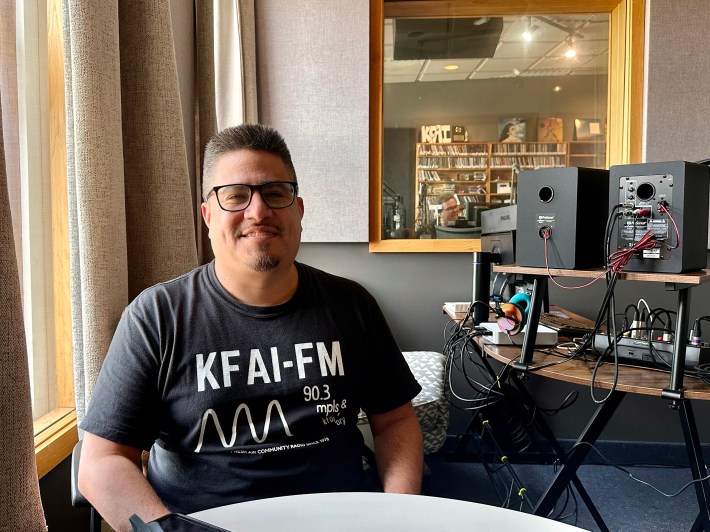
It helps that some of these hosts, including Bop Street’s Lee, have been with the station for 30 or 40 years. “Willie Dominguez on Sabados Alegres, that’s the longest-running Spanish-language program in Minnesota,” Lee says. “Now there are a couple radio stations, but 40 years ago, there was Willie.” Fresh Fruit, he adds, is the longest-running queer radio program in the country.
Volunteers do more than host shows. Some work in the music library, sifting through mountains of physical media, and others work in the archives. Some work the front desk, greeting guests as they enter the third-floor studio, or they fulfill orders, or table at events. Still others record “carts,” those interstitial announcements like “support for the station comes from…”
There are only a handful of radio stations left in the country that operate with this kind of volunteer support, and it all comes together to create a listening experience that, for all its globetrotting and genre-hopping, feels personal and distinctly local.
“When folks tune in, they’re listening for their favorite pal. They have a relationship with the host,” says executive director Doherty. “The autonomy is also very special… [we all] understand how precious and finite this resource is.”
“What I noticed is that our content and our folks here—it’s far more varied and far more diverse on our radio dial,” Vargas says. “I’ve been spoiled here, because of that kind of freedom.”
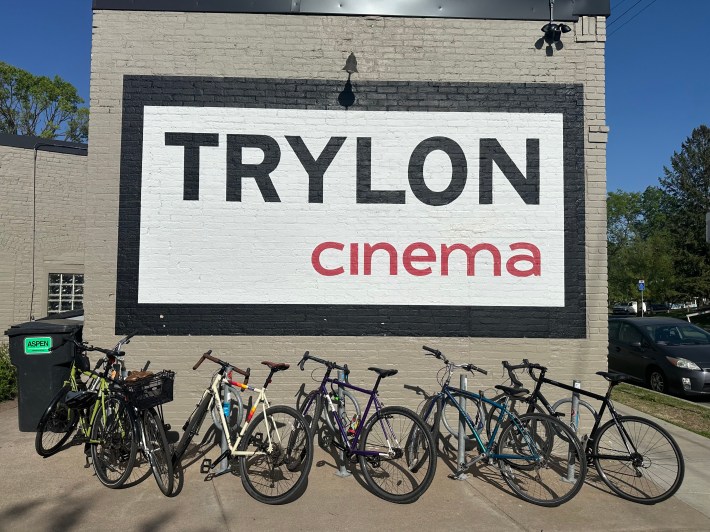
“It’s So Much Sweeping”: Trylon Cinema’s Volunteers Become Friends and Family (They Also Don’t Want to Leave)
Maybe you think volunteering at the Trylon sounds like a dream—free movie screenings, free popcorn, endless conversation with fellow movie-loving volunteers about the merits of Jim Jarmusch’s oeuvre or the best Nicolas Cage movies. But heed the warning of the Minneapolis movie theater’s volunteer coordinator: “It’s so busy,” chuckles Nikki Weispfenning, who’s also the theater’s lead projectionist. “And it’s so much sweeping.”
Nevertheless, the Trylon has a stable of roughly 40 committed volunteers who are undaunted by the amount of popcorn embedded in the carpet, along with what director Barry Kryshka describes as a “pretty substantial” waitlist for new volunteers. It’s not uncommon to meet a volunteer who’s been with the nonprofit theater since 2015, or 2017; some have been volunteering since it opened in 2009.
“I feel like kind of a newbie, still, even though I’ve been at this for almost a year,” says Louis Gagnon, who finally landed an open slot after discovering the Longfellow theater more than five years ago.
There’s something about the volunteer-run nature of Trylon that helps make it feel positive and welcoming, no matter how into film you are.
“We have so many people that volunteer, and they inevitably bring their friends, their coworkers, their families through,” Weispfenning says. “It is a really natural way to pull in a lot of people that might not otherwise be coming to see the weird movies that we show.”
“I think sometimes I get more cred than I deserve as a Trylon volunteer. People are like, ‘Oh, you must be a real film buff,’ and I’m not, at all,” says Amelia Foster, a Longfellow resident for over a decade and volunteer for the last three years.
And volunteers do more than hand out and sweep up popcorn kernels. The posters for Trylon screenings and series are all designed by volunteers. Perisphere, the Trylon’s blog, is edited by the two-person team of Olga Tchepikova-Treon and Finn Odum. (Odum also operates the Trylon’s Letterboxd account, where you can follow along for the theater’s institutional thoughts on Air Bud.)
Odum says some of her closest friends are volunteers and customers at the Trylon; isolation and friendship is a subject they’ve explored through the lens of film on the Perisphere blog. She even moved to the neighborhood, two blocks away from the Trylon, making it easier to get to Sunday afternoon shifts.
“I would be there anyway, if I wasn’t volunteering,” she says.
There’s even a Trylon podcast, Trylove, that compliments screenings and features interviews with volunteers, writers, and other cinephiles. Its hosts, Jason Dafnis, Cody Narveson, Harry Mackin, and Aaron Grossman? They’re not volunteers nor are they formally affiliated with the Trylon. “They just want to find ways to bring more people into the theater,” Odum says.
“As a person who’s been freelance and turned a lot of things I care about into a side hustle, it means a lot to have something that’s not at all monetary like my regular commitments,” Foster says. It feels like she’s building relationships in a different way, and doing something purely for the love of doing it alongside other people for whom this is a meaningful source of joy and fun.
“You show up, you do the ticket and concessions thing, you clean the popper, and you get so much from being part of the community,” she continues. It’s not just about special volunteer screenings and exclusive merch, but having a voice during programming meetings and feeling like you’re really part of something bigger than yourself.
“My philosophy is, like, living in the grim, dystopian, late-stage capitalist landscape of 21st-century America, I feel so much of the alienation and atomization that people experience is from their lives consisting of just: go to work, go home, go to work, go home,” Gagnon says. “I just really strongly value having places like the Trylon to go hang out at.”
“As someone who’s not from here, it’s been a really good source of community and friendship,” volunteer Becca Mayo adds. “And it really is the best popcorn, I will say that.”



